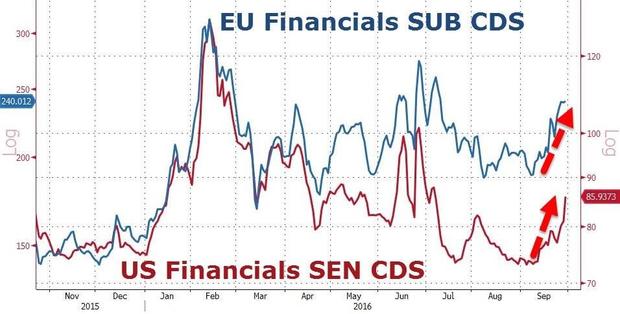Shades of 2008: Deutsche Bank fears roil stocks
U.S. equities finished sharply lower on Thursday amid reports hedge funds are pulling collateral out of troubled German financial titan Deutsche Bank (DB) due to ongoing concerns about its balance sheet health. Shares of the European institution fell to record lows, down nearly 80 percent from their early 2014 highs, as it struggles with a tepid Eurozone economy, worries about the costs associated with Brexit, and regulatory fines here in the United States.
Spiking the punch has been indications the German government is reluctant to get involved with state aid to the country’s largest bank, which is being asked by U.S. regulators for $14 billion to settle legal claims over its sales of mortgage securities.
Deutsche Bank shares lost 6.7 percent in U.S. trading on Thursday as headlines filled up with stories eerily reminiscent of the 2008-2009 financial crisis -- full of questions about counterparty risk, increased credit default swap prices, and tightening inter-bank liquidity. As a result, the bank’s market cap dropped below beleaguered new-tech disappointment Twitter (TWTR).
What’s scary is that the fear and contagion is spreading to American banks as well. Financial stocks were weak, down 1.5 percent in sympathy. The chart above, of credit default swap prices, shows the contagion effect in play as traders bid up these assets that are, in effect, an insurance contract against a default. Morgan Stanley (MS) shares lost 2.3 percent.
The chatter across financial trading desks is that the waterfall decline in Deutsche Bank shares looks frighteningly similar to the decline in Lehman Brothers ahead of its collapse. One critical difference that makes this worse: Deutsche Bank is a retail bank with depositors. A loss of confidence by regular German citizens pulling their cash out of the bank will accelerate the problem.
Professionals are already losing faith. Reportedly 10 hedge funds have reduced their exposure to Deutsche Bank by reducing excess cash in their accounts. Moreover, other banks and trading counterparties are apparently modifying existing credit agreements with some demanding “triparty” contracts that bring in another bank to protect against the risk of default.
Deutsche Bank isn’t alone in feeling the pressure: Germany’s second biggest bank, Commerzbank, has abruptly canceled its dividend to shareholders for the rest of the year and is cutting nearly 10,000 jobs, or roughly 20 percent of its workforce.
The fear for these funds is a repeat of the 2008 collapse of Lehman or the 2011 bankruptcy of MF Global in which billions of dollars of assets were frozen until legal proceedings could be resolved.
Evidence that the worries over Deustche Bank are resulting in systemic pressure can be seen in the way the cost to borrow U.S. dollars in Europe are surging as many turn to the European Central Bank’s dollar lending facility for short-term borrowing needs.
The concerns won’t be easily fixed, since they get at the heart of many of the problems that have been swept under the rug by central bankers and policies in recent years: lingering bad debt, incomplete financial market reforms, tepid economic growth and the underlying fragility of the Eurozone.
Bond manager Jeffrey Gundlach of DoubleLIne Capital told Reuters it’s best for investors to steer clear as the situation is “un-analyzable.” The outcome? “The market is going to push down Deutsche Bank until there is some recognition of support. They will get assistance, if need be.”

